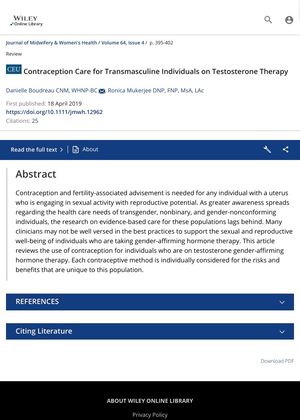TLDR Transmasculine individuals on testosterone therapy need tailored contraception and fertility advice due to unique risks and benefits of each contraceptive method.
The document "Contraception Care for Transmasculine Individuals on Testosterone Therapy" from April 17, 2019, discussed the need for contraception and fertility-related advice for individuals with a uterus who are sexually active and have reproductive potential. The authors noted that while awareness of the healthcare needs of transgender, nonbinary, and gender-nonconforming individuals was increasing, research on evidence-based care for these populations was lagging. The article reviewed the use of contraception for individuals on testosterone gender-affirming hormone therapy, considering the unique risks and benefits of each contraceptive method for this population.
 23 citations
,
October 2016 in “Journal of Midwifery & Women's Health”
23 citations
,
October 2016 in “Journal of Midwifery & Women's Health” The document concludes that health care providers should offer culturally competent care and more research is needed to improve health outcomes for transgender individuals.
 45 citations
,
March 2015 in “Clinical Endocrinology”
45 citations
,
March 2015 in “Clinical Endocrinology” Testosterone therapy is generally safe for transmen, improves sexual function, and has manageable health risks with proper monitoring.
 6 citations
,
April 2019 in “Endocrinology and Metabolism Clinics of North America”
6 citations
,
April 2019 in “Endocrinology and Metabolism Clinics of North America” Testosterone therapy for transmasculine individuals is generally safe with medical supervision, improves mental health, and has mixed effects on physical health.
 15 citations
,
February 2019 in “Internal Medicine Journal”
15 citations
,
February 2019 in “Internal Medicine Journal” Australian doctors experienced in adult transgender healthcare mostly prescribe intramuscular testosterone and oral estradiol, recommend mental health assessments before hormone therapy, and support improved training and guidelines.
 28 citations
,
October 2018 in “Clinical Obstetrics and Gynecology”
28 citations
,
October 2018 in “Clinical Obstetrics and Gynecology” Testosterone therapy seems safe and effective for transgender men with proper care, but more long-term research is needed.





